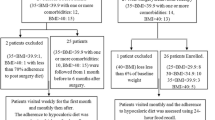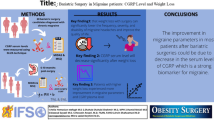Abstract
Introduction
Recent research has demonstrated an association between obesity and migraine headaches. Furthermore, studies have demonstrated that migraine improvement can occur with significant weight loss. Given that bariatric surgery is the most effective intervention for obesity and obesity-related comorbidities, there is potential for bariatric surgery to improve migraine symptoms. The objective of this study was to conduct a systematic review and meta-analysis to determine the effect of bariatric surgery on migraine headaches.
Methods
A comprehensive literature search from database inception to December 2018 was conducted for studies examining the effect of bariatric surgery on migraines. Patients of all ages who had a history of migraines undergoing primary bariatric surgery were included. Primary outcomes included migraine frequency, severity, and disability.
Results
Four studies were included (n = 159). Frequency of migraines was markedly reduced after bariatric surgery, with fewer symptomatic days suffered by patients per month post-operatively (mean difference [MD] - 5.56 days, 95%CI 0.14 to 10.99, p = 0.04). The degree of migraine headache-related disability as measured by the Migraine Disability Assessment Scale (MIDAS) was also significantly lower following bariatric surgery (MD - 14.72, 95%CI 10.08 to 19.36, p < 0.001). The severity of migraine headache pain before and after surgery was reduced with borderline statistical significance (MD - 3.53, 95%CI - 0.12 to 7.17, p = 0.06).
Conclusion
Migraine severity, frequency, and headache-related disability were improved 6 months after bariatric surgery. However, this systematic review was limited by a low number of studies and larger high-quality, randomized trials are needed to determine the effect of bariatric surgery on migraine headaches.




Similar content being viewed by others
References
Hruby A, Hu FB. The epidemiology of obesity: a big picture. Pharmacoeconomics. New Zealand. 2015;33:673–89.
Rogula T, Thodiyil PA, Brethauer SA, et al. In: Schauer PR, Schirmer BD, Brethauer SA, editors. Laparoscopic Roux-en-Y gastric bypass: outcomes BT - minimally invasive bariatric surgery. New York: Springer New York; 2007. p. 271–80.
Bigal ME, Rapoport AM. Obesity and chronic daily headache. Curr Pain Headache Rep. United States. 2012;16:101–9.
Jahromi SR, Abolhasani M, Meysamie A, et al. The effect of body fat mass and fat free mass on migraine headache. Iran J Neurol. Iran. 2013;12:23–7.
Horev A, Wirguin I, Lantsberg L, et al. A high incidence of migraine with aura among morbidly obese women. Headache. United States. 2005;45:936–8.
Peres MFP, Lerario DDG, Garrido AB, et al. Primary headaches in obese patients. Arq Neuropsiquiatr. Brazil. 2005;63:931–3.
Lipton RB, Stewart WF, Diamond S, et al. Prevalence and burden of migraine in the United States: data from the American Migraine Study II. Headache. United States. 2001;41:646–57.
Peterlin BL, Rosso AL, Rapoport AM, et al. Obesity and migraine: the effect of age, gender and adipose tissue distribution. Headache. United States. 2010;50:52–62.
Robberstad L, Dyb G, Hagen K, et al. An unfavorable lifestyle and recurrent headaches among adolescents: the HUNT study. Neurology. United States. 2010;75:712–7.
Ford ES, Li C, Pearson WS, et al. Body mass index and headaches: findings from a national sample of US adults. Cephalalgia. England. 2008;28:1270–6.
Scher AI, Stewart WF, Ricci JA, et al. Factors associated with the onset and remission of chronic daily headache in a population-based study. Pain. United States. 2003;106:81–9.
Bond DS, Roth J, Nash JM, et al. Migraine and obesity: epidemiology, possible mechanisms and the potential role of weight loss treatment. Obes Rev. England. 2011;12:e362–71.
Verrotti A, Agostinelli S, D’Egidio C, et al. Impact of a weight loss program on migraine in obese adolescents. Eur J Neurol. England. 2013;20:394–7.
Peterlin BL. Bariatric surgery in obese migraineurs: mounting evidence but important questions remain. Cephalalgia. England. 2011;31:1333–5.
Angrisani L, Santonicola A, Iovino P, Vitiello A, Higa K, Himpens J, et al. IFSO Worldwide Survey 2016: Primary, Endoluminal, and Revisional Procedures. Obes Surg. 2018;28:3783–94.
Buchwald H, Avidor Y, Braunwald E, et al. Bariatric surgery: a systematic review and meta-analysis. JAMA. 2004;292:1724–37.
Bond DS, Vithiananthan S, Nash JM, et al. Improvement of migraine headaches in severely obese patients after bariatric surgery. Neurology. United States. 2011;76:1135–8.
Novack V, Fuchs L, Lantsberg L, et al. Changes in headache frequency in premenopausal obese women with migraine after bariatric surgery: a case series. Cephalalgia. England. 2011;31:1336–42.
Razeghi Jahromi S, Abolhasani M, Ghorbani Z, et al. Bariatric surgery promising in migraine control: a controlled trial on weight loss and its effect on migraine headache. Obes Surg. United States. 2018;28:87–96.
Gunay Y, Jamal M, Capper A, et al. Roux-en-Y gastric bypass achieves substantial resolution of migraine headache in the severely obese: 9-year experience in 81 patients. Surg Obes Relat Dis. United States. 2013;9:55–62.
Slim K, Nini E, Forestier D, et al. Methodological index for non-randomized studies (minors): development and validation of a new instrument. ANZ J Surg. 2003;73:712–6.
Higgins JPT, Green S. Cochrane Handbook for Systematic Reviews of Interventions. Cochrane Collab. 2011;4.
Higgins JPT, Thompson SG, Deeks JJ, Altman DG. Measuring inconsistency in meta-analyses. BMJ. 2003;327:557–60.
Peterlin BL, Bigal ME, Tepper SJ, et al. Migraine and adiponectin: is there a connection? Cephalalgia England. 2007;27:435–46.
Bigal ME, Lipton RB, Holland PR, et al. Obesity, migraine, and chronic migraine: possible mechanisms of interaction. Neurology. United States. 2007;68:1851–61.
Goadsby PJ. Pathophysiology of migraine. Ann Indian Acad Neurol. Medknow Publications & Media Pvt Ltd. 2012;15:S15–22.
Noseda R, Burstein R. Migraine pathophysiology: anatomy of the trigeminovascular pathway and associated neurological symptoms, CSD, sensitization and modulation of pain. Pain. 2013; https://doi.org/10.1016/j.pain.2013.07.021.
Tepper DE. Migraine and Obesity. Headache J Head Face Pain. John Wiley & Sons, Ltd (10.1111). 2013;53:719–20.
Gruber H-J, Bernecker C, Pailer S, et al. Lipid profile in normal weight migraineurs - evidence for cardiovascular risk. Eur J Neurol. 2010;17:419–25.
Kuo LE, Kitlinska JB, Tilan JU, et al. Neuropeptide Y acts directly in the periphery on fat tissue and mediates stress-induced obesity and metabolic syndrome. Nat Med. United States. 2007;13:803–11.
Gallai V, Sarchielli P, Trequattrini A, et al. Neuropeptide Y in juvenile migraine and tension-type headache. Headache. United States. 1994;34:35–40.
Baranowska B, Wolinska-Witort E, Martynska L, et al. Plasma orexin A, orexin B, leptin, neuropeptide Y (NPY) and insulin in obese women. Neuro Endocrinol Lett. Sweden. 2005;26:293–6.
Lambert GW, Straznicky NE, Lambert EA, et al. Sympathetic nervous activation in obesity and the metabolic syndrome--causes, consequences and therapeutic implications. Pharmacol Ther. England. 2010;126:159–72.
Peroutka SJ. Migraine: a chronic sympathetic nervous system disorder. Headache. United States. 2004;44:53–64.
Rubino F, Gagner M, Gentileschi P, et al. The early effect of the Roux-en-Y gastric bypass on hormones involved in body weight regulation and glucose metabolism. Ann Surg. United States. 2004;240:236–42.
Verrotti A, Carotenuto M, Altieri L, et al. Migraine and obesity: Metabolic parameters and response to a weight loss programme. Pediatr Obes. 2015;10:220–5.
Peterlin BL. The role of the adipocytokines adiponectin and leptin in migraine. J Am Osteopath Assoc. United States. 2009;109:314–7.
Maeda T, Kiguchi N, Kobayashi Y, et al. Leptin derived from adipocytes in injured peripheral nerves facilitates development of neuropathic pain via macrophage stimulation. Proc Natl Acad Sci U S A. 2009;106:13076–81.
Friedman DI, Jacobson DM. Diagnostic criteria for idiopathic intracranial hypertension. Neurology. United States. 2002;59:1492–5.
Wall M. Idiopathic intracranial hypertension (pseudotumor cerebri). Curr Neurol Neurosci Rep. United States. 2008;8:87–93.
Banik R. Obesity and the role of nonsurgical and surgical weight reduction in idiopathic intracranial hypertension. Int Ophthalmol Clin. United States. 2014;54:27–41.
Manfield JH, Yu KK-H, Efthimiou E, et al. Bariatric surgery or non-surgical weight loss for idiopathic intracranial hypertension? A systematic review and comparison of meta-analyses. Obes Surg. Springer US. 2017;27:513–21.
Author information
Authors and Affiliations
Corresponding author
Ethics declarations
Conflict of Interest
The authors declare that they have no conflicts of interest.
Ethical Approval
This article does not contain any studies with human participants or animals performed by any of the authors.
Informed consent
For this type of study, formal consent is not required.
Additional information
Publisher’s Note
Springer Nature remains neutral with regard to jurisdictional claims in published maps and institutional affiliations.
Rights and permissions
About this article
Cite this article
Dang, J.T., Lee, J.K.H., Kung, J.Y. et al. The Effect of Bariatric Surgery on Migraines: a Systematic Review and Meta-analysis. OBES SURG 30, 1061–1067 (2020). https://doi.org/10.1007/s11695-019-04290-9
Published:
Issue Date:
DOI: https://doi.org/10.1007/s11695-019-04290-9




